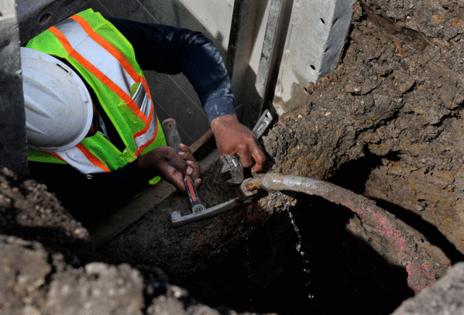New EPA rule means local governments must check more pipes for lead
Published in Science & Technology News
ATLANTA — Metro Atlanta’s largest water utilities, in response to a federal deadline, reported this fall that there were no lead pipes in their drinking water systems that they knew of.
But thousands of pipes on private property remain unchecked. And a new federal rule requires local governments and water utilities to be more proactive about checking those lines, which usually run from water meters to people’s homes.
The new rule, finalized in October, requires all lead water pipes in the country to be replaced within a decade. It also reduces the amount of lead allowed in drinking water and mandates testing at schools and day care centers.
Exposure to lead can severely harm mental and physical development in children. In adults, it can increase blood pressure, decrease kidney function and cause heart disease and cancer. The effects are irreversible.
“We’ve known for decades that lead exposure has serious long-term impacts for children’s health,” Environmental Protection Agency Administrator Michael Regan said in a news release. “And yet, millions of lead service lines are still delivering drinking water to homes. President Biden is putting an end to this generational public health problem.”
Water systems must identify the materials of all their service lines regardless of ownership, including pipes that run from meters to building entrances, said Sara Lips, spokesperson for the Georgia Environmental Protection Division. The rule says water systems must make four attempts using two different communication methods to obtain consent from private property owners, if necessary. Workers might be able to investigate service lines while reading meters, according to the EPA.
The new federal rule does not take effect until 2027, but the EPD is urging water utilities to begin the process now and many are doing so, Lips said.
Lead pipes are not as prevalent in Georgia as in some other states. The federal government banned the use of lead pipes or solder in drinking water systems in 1986, but most utilities stopped using them in the 1950s. The EPA estimates around 46,000 lead water lines exist in Georgia.
The federal government estimates lead water pipes supply more than 9 million homes nationwide and replacing all of them could cost at least $45 billion.
The Bipartisan Infrastructure Law has provided almost $161 million for service line inventory and replacement in Georgia since 2021, according to data from the Georgia Environmental Finance Authority. Another $119 million is expected through 2026.
The Gwinnett County Department of Water Resources, which serves almost 300,000 accounts, said a full service line inventory has been completed.
“Through our extensive research and investigation, which included on-site verifications, documentation, and third-party plumber interviews, we can confidently say that there are no lead service lines in Gwinnett County,” the department told residents on its website. “This means that the pipes delivering water to your meter and your home do not contain lead or lead solder.”
Many of the pipes were made of polyvinyl chloride, polyethylene, copper or polybutylene, said Rebecca Shelton, the water department director.
Gwinnett County Public Schools conducted its own testing. Results are being posted on the Clean Water for Georgia Kids website. The county will spend water and sewer operating funds to sample about 250 private child care facilities, Shelton said.
The city of Atlanta provided records showing none of its 187,000 service lines were made of lead. A watershed department spokesperson said that inventory included private service lines where they connect to meters within the meter boxes. The pipes are mostly copper, the spokesperson said.
The DeKalb County watershed department, which serves more than 217,000 water accounts, sent letters last month to about 155,000 addresses stating the materials of their service lines are unknown. The letters explained how property owners could check their own pipe materials. About 1,000 people have done so and none of their pipes were lead. The watershed department has started inspecting private service lines during routine work, county spokesperson Andrew Cauthen said.
The Georgia Environmental Finance Authority last month lent more than $16 million to DeKalb County for lead service line inventory and replacement. The county must pay the money back over 20 years at 2.25% interest. DeKalb will use the money to investigate the unknown lines and invest in a predictive model to minimize disturbances to private property, Cauthen said.
Most service lines in DeKalb are made of copper, but larger pipes serving commercial buildings are made of ductile or cast iron, Cauthen said. The DeKalb watershed department has finished school and child care sampling, he said.
The Cobb County Water System, which serves approximately 195,000 customer accounts, said all public and customer-owned service lines were inspected. None were unknown and none were lead, according the county,
Fulton County serves almost 72,000 accounts that supply drinking water to more than 280,000 people north of Sandy Springs. The county sent more than 25,000 letters to property owners whose pipes were made of an unknown material. Fulton plans to begin investigating those pipes in early 2025, according to the public works department.
Most of the public pipes are made of copper, but some are “galvanized” iron, meaning they have a protective zinc coating. Most of the private pipes are plastic, either polyvinyl chloride (PVC) or cross-linked polyethylene (PEX) while some are copper or galvanized iron.
Federal rules mandate the replacement of galvanized pipes that have been downstream of lead lines or are currently downstream of lines of unknown material. Fulton plans to replace 24 galvanized lines out of an abundance of caution, the public works department said.
The county is budgeting more than $1.6 million from water and sewer rate revenue next year to inventory service lines. School and child care sampling in north Fulton will begin in 2028, according to the public works department.
©2025 The Atlanta Journal-Constitution. Visit at ajc.com. Distributed by Tribune Content Agency, LLC.







Comments